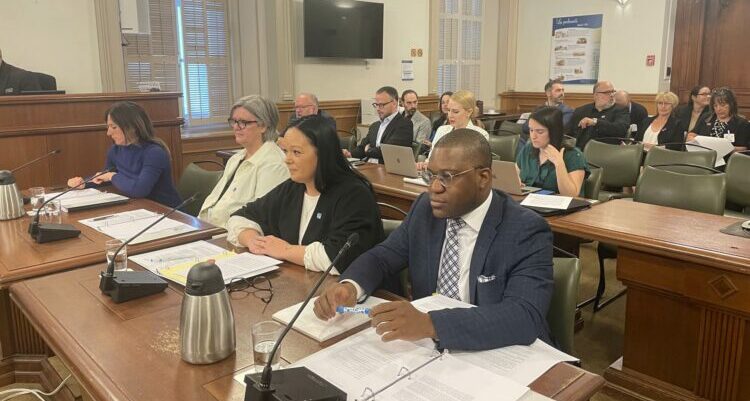
Bill 15 : The FIQ is proposing 30 recommendations for a democratic reform of the health network
In a spirit of openness and collaboration, the Fédération interprofessionnelle de la santé du Québec – FIQ appeared before the Parliamentary Commission on Bill 15, An Act to make the health and social services system more effective. “We are making 30 recommendations to the government today. Obviously for the good of the healthcare professionals we represent, but also for that of the patients and with defending the public nature of the health network as a backdrop”, explained Julie Bouchard, president of the FIQ, to the representatives on the commission.
In an extensive brief, the Federation stresses that the status quo is untenable. “While we agree with the Minister of Health that ways must be found to make the network more efficient and accessible, it is essential for us to bring managers closer to the field, with real power, and to improve the quality of care”, continued Ms. Bouchard. With its knowledge of the field, its members and the health network, the FIQ is submitting substantial and balanced recommendations that are essential to establishing the winning conditions for the reform proposed by Minister Christian Dubé’s bill. “We hope they will be taken under consideration by the members of the commission to avoid repeating the mistakes and shortcomings of past health network reforms”, stated the president.
Access, quality and safety of care
For the healthcare professionals, the quality of care is a must. It’s a basic notion that should clearly appear in the mission of Santé Québec. Moreover, the Federation believes that it is necessary to go beyond traditional patient satisfaction surveys and performance indicators, as this will only expose a partial and potentially biased viewpoint. “It is essential to include nursing sensitive indicators in analyzing the quality. Think about the number of falls, pressure sores, care-acquired infections or medication errors”, explained the president.
Decentralization and autonomy
As the bill is currently drafted, Santé Québec would have the power to dictate to each region and its subordinate institutions how they should operate, rather than giving the various local authorities the real power to decide according to their local realities. The FIQ recommends therefore that the bill explicitly provide for the rights and decision-making powers of the administrative units under the aegis of Santé Québec. These should include responsibility and real autonomy in terms of human resources and labour relations. “They must be able to act, among other things, on the organization of work, the self-management of schedules, the settlement of grievances and allow greater managerial flexibility. Administrative units should also be accountable for their decisions,” she said.
This same logic must also apply to local managers according to the labour organization. “If the Minister of Health truly wants to make community-based management a reality, the roles and responsibilities must be spelled out in the bill from the outset. Managers must be able to administer the budget, develop appropriate management frameworks, or have the latitude for local initiatives in clinical governance”, specified Ms. Bouchard. It is with this view that the FIQ also recommends that a labour relations structure be maintained in the Santé Québec organization. “Effective local labour relations will both avoid the judicialization of several conflicts and find efficient and fast solutions in the field”, explained the president.
Protecting the public nature of the network
The Federation is very concerned about the way the private sector is blatantly favoured in the bill. It is asking that some sections be reworded to clearly identify the prominence of the public system over the role of the private sector. “For over 20 years, successive governments have been quietly laying the groundwork for greater privatization of the network. The solution to high efficiency should lie in attracting and retaining staff in the public system rather than simply relocating care to the private sector”, explained the president. Hence, the Federation recommends that a section be added to the bill specifying that the private sector will only be used for day surgeries as a last resort and only in exceptional circumstances.
The 26 local matters to the provincial level
Since 2003, 26 matters identified in the law are negotiated at the local level. One of the direct consequences of the bill will be that with a single employer, the so-called local negotiations, will become provincial. “Therefore, we recommend that all 26 local matters are reintegrated into the provincial negotiations while permitting local arrangements to meet the needs of each institution”, concluded Ms. Bouchard.